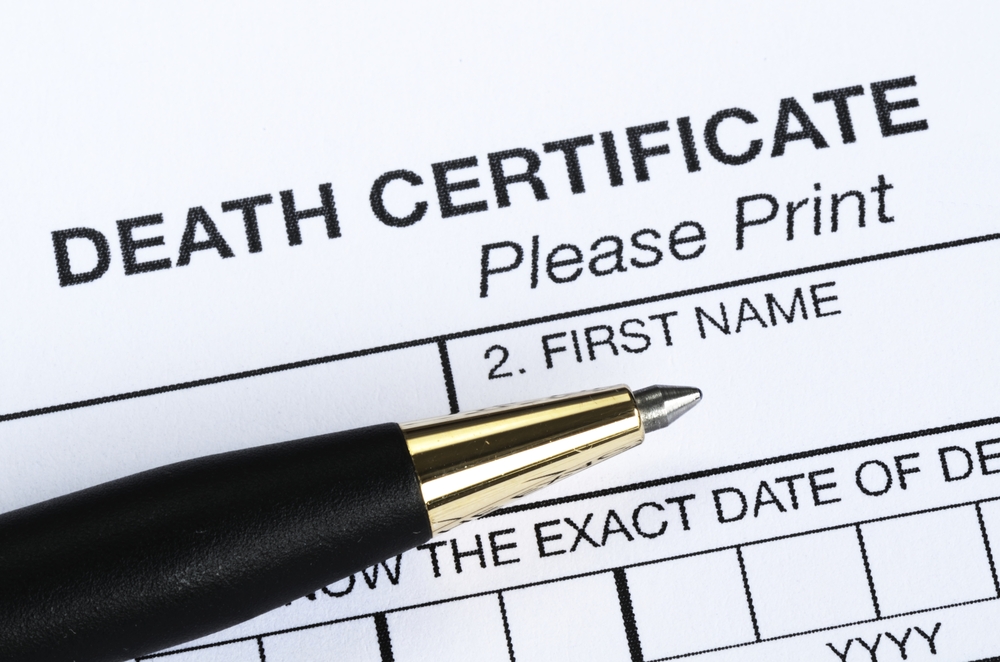Mark Kopec Now
Death Certificate
Death Certificates: A Crucial Document in Medical Malpractice Cases
Death certificates are legal documents that formally record the death of an individual. They serve various critical purposes, including vital statistics tracking, legal proceedings, and family closure. In the context of medical malpractice litigation, death certificates play a pivotal role. They establish the cause of death and also support legal claims.
A Historical Overview
The concept of formally recording deaths dates back centuries. Early forms of death registration aimed primarily at tracking mortality rates and identifying potential public health threats. Over time, death certificates evolved to include more detailed medical information, reflecting advancements in medical science and a growing understanding of disease processes.
In the United States, the modern system of death registration began in the late 19th century, driven by the need for accurate public health data and the growing complexity of legal and social issues surrounding death. The National Vital Statistics System (NVSS), administered by the Centers for Disease Control and Prevention (CDC), currently oversees the collection and dissemination of vital statistics data, including death certificates.

Who Prepares Death Certificates?
The responsibility for completing one typically falls on the attending doctor or other qualified medical professionals who were involved in the patient’s care. In some cases, medical examiners or coroners may be required to complete the certificate, particularly in cases of suspicious or unexpected deaths.
Information Typically Included
Death certificates typically include the following information:
- Decedent’s Information: Full name, date of birth, social security number, sex, race, ethnicity, marital status, and place of birth.
- Date and Place of Death: The exact date and time of death, as well as the location of death (e.g., hospital, residence, hospice).
- Informant’s Information: The name and relationship of the person providing information for the certificate.
- Cause of Death: This is a crucial section and typically includes two parts:
- Immediate Cause: The specific disease or injury that directly led to death (e.g., myocardial infarction).
- Underlying Cause: The underlying disease or condition that initiated the sequence of events leading to death (e.g., atherosclerotic heart disease).
- Other Significant Conditions: Any other conditions that contributed to the death or affected the decedent’s health.
- Manner of Death: This section classifies the death as one of the following:
- Natural: Due to disease or aging.
- Accidental: Resulting from an unintentional injury.
- Suicide: Intentionally self-inflicted.
- Homicide: Caused by another person.
- Undetermined: When the cause or manner of death cannot be definitively determined.
Death Certificates in Medical Malpractice Cases
They play a crucial role in medical malpractice litigation. Death certificates provide essential information about the cause and manner of death, which can be used to support or refute claims of medical negligence.
Key Uses in Malpractice Cases
- Establishing the Cause of Death: The certificate’s information on the cause and manner of death is vital for establishing a causal link between the alleged medical negligence and the patient’s death.
- Identifying Potential Negligence: Discrepancies or inconsistencies in the information on the death certificate may raise red flags for potential medical errors or negligence. For example, if the death certificate lists a cause of death that differs significantly from the medical records, it may indicate a misdiagnosis, surgical error or other treatment error.
- Supporting Legal Claims: The information can support various legal claims, such as wrongful death, medical malpractice, and negligence.
- Discovery and Evidence: Death certificates are often requested during the discovery phase of a medical malpractice lawsuit to gather relevant information about the decedent’s medical history and the circumstances surrounding their death.
Challenges and Limitations
While death certificates are valuable tools, they also have limitations:
- Subjectivity: The determination of the cause of death can be subjective and may vary depending on the physician’s interpretation and available information.
- Accuracy: Inaccuracies or errors in the information on the death certificate can have significant implications for legal proceedings and public health data.
- Lack of Detail: They often provide a simplified overview of the cause of death and may not include all the relevant medical details necessary for a thorough investigation of potential medical negligence.
Maryland
In Maryland, the Division of Vital Records is responsible for overseeing the registration of deaths. The Maryland Department of Health provides specific guidelines and forms for completing death certificates.
Key Points in Maryland
- Physician Responsibility: Physicians are generally responsible for completing death certificates for patients under their care.
- Medical Examiner Involvement: Medical examiners investigate and certify deaths in certain circumstances. These include suspicious deaths, accidental deaths, and deaths occurring in unusual or unexpected circumstances.
- Legal Requirements: Maryland law requires that they be filed with the local health department within a specific timeframe.
For more information on death certificates in Maryland, and a link to request one, go to Additional Resources.
Conclusion
Death certificates are essential legal and public health documents that provide crucial information about the cause and manner of death. In the context of medical malpractice litigation, they play a vital role. They establish the facts surrounding the patient’s death and support legal claims. While death certificates have limitations, they remain an important tool for investigating potential medical negligence and ensuring patient safety.
If you have any questions about death certificates and medical malpractice claims, then visit our free consultation page or video. Then contact the Kopec Law Firm at 800-604-0704 to speak directly with Attorney Mark Kopec. He is a top-rated Baltimore medical malpractice lawyer. The Kopec Law Firm is in Baltimore and pursues cases throughout Maryland and Washington, D.C.





